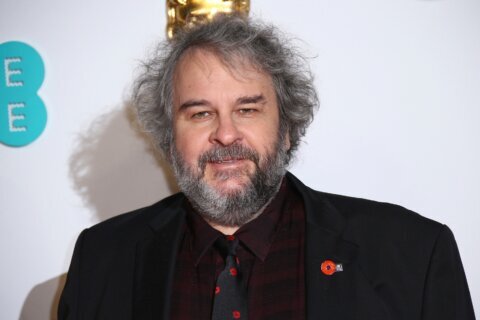Hear the full conversation on today’s “Beyond the Fame” podcast.
He’s built quite the career since Rolling Stone named him Best New Artist in 1998. Now, you can see Rufus Wainwright perform at The Anthem this coming Tuesday.
“It’s been a while since I’ve played D.C. proper,” Wainwright told WTOP. “I’ve done little gigs around there, but I’m very excited to get back to our nation’s capital.”
It’s his first tour since the pandemic began. Wainwright has used his time away from the road to focus on creativity.
“I have managed to stay busy throughout the entire pandemic,” Wainwright said. “I actually needed the time to focus on songwriting, even practicing piano and working on some musicals and stuff, so I took it as a gift actually. But yes, I miss traveling, I miss seeing my fans and I miss the electricity of a live audience with a live performance, so I am excited to get back out.”
Born in 1973 in Rhinebeck, New York, Wainwright may have been destined for a life in music.
His mother, Kate McGarrigle was a songwriter and half of a famous Canadian folk duo with her sister, Anna. His father, Loudon Wainwright III, was also a famous songwriter, known best for his ironic lyrics and pop-up performances on the ’70s war comedy “M*A*S*H”.
“I was a poster child for showbiz lore,” he said. “I wasn’t quite born in a truck or anything, but my first ever crib outside of the hospital was a guitar case. More the folk-rock version, because my mom went with my dad in the studio after the hospital and they put me in a guitar case.”
When Wainwright was 3, after his parents divorce, he moved to Montreal, Canada with his mother.
“From a very early age I expressed a real precocious nature and loved to sing and perform,” Wainwright said. “My mother very much took on the challenge and really enjoyed that whole process. She loved to teach people music in general and to play music with people, so to have her son so eager was a real blessing that she took advantage of.”
Still, he looks back to one specific moment that changed the entire course of his life.
“When I was about 13 years old, I had a major conversion to opera,” Wainwright said. “I plunged into this passion for that type of music. It was very quick, I heard one piece, I was listening to Verdi’s ‘Requiem,’ and, after that two-hour séance, I could only listen to opera. That was really for me the beginning of my personal journey into the world of music, specifically with songwriting.”
That passion would eventually lead to him writing two original operas, “Prima Dona” (2009) and “Hadrian,” which premiered in 2018 in Toronto, Canada.
“‘Prima Dona’ had its ups and downs. It was by no means a critical success, but there’s been seven productions of it all over the world. Singers love singing it, so it seems to have survived and is beginning to flourish,” Wainwright said. “We’re doing ‘Hadrian’ this summer in Spain … They seem to have lives of their own now.”
As for his life in popular music, Wainwright signed with DreamWorks Records for a self-titled debut in 1998.
“Thankfully I wasn’t aware at the time of what was happening,” Wainwright said. “I was certainly excited about getting all the attention, being in the spotlight and having a true power behind me in terms of what that meant years ago when you were on a major label. But I was more concerned with the music, the quality of the recordings and the performance I wanted to try to pull off.”
The album landed him a Best New Artist nod from Rolling Stone magazine.
“My attitude was like, ‘Oh, of course. I’m Best New Artist in Rolling Stone because I am the best new artist.’ It didn’t seem like such a stretch to me. I just kind of rolled with it. It’s funny, that was identified by certain people as megalomania or conceitedness, but it actually wasn’t. I just felt like it was part of the process like, ‘Why would I be doing this if I didn’t want to be the best I can be?'”
His DreamWorks connection allowed him to record his cover of Leonard Cohen’s classic “Hallelujah” for the “Shrek” soundtrack. It was a powerful rendering that some say rivals Jeff Buckley’s cover, or even the original.
“I didn’t know the song,” Wainwright said. “I was called in one afternoon to lay it down … I think it took like an hour, then it made it onto the soundtrack … The next thing you know, people are asking me to sing it all the time.”
The connection to Leonard Cohen was not pure happenstance. As a child, Wainwright was friends with Cohen’s son Adam, and daughter Lorca. He later donated sperm to Lorca, who gave birth to their daughter, Viva Katherine Wainwright Cohen in 2011. The two share parenting roles along with Wainwright’s partner Jörn Weisbrodt.
“I’ve known the family for many years … I had a very good relationship with Leonard too. We’re all from Montreal, which is a big plus. The craziness of life brought us this beautiful soul, who is Viva our daughter, and she never ceases to amaze everybody.”
Fatherhood themes have permeated his work, including the song “Dinner at Eight.”
“I wrote ‘Dinner at Eight’ after I had, arguably, the worst argument with my father ever,” Wainwright said. “I actually had to leave the house and drive back to the city that night because we didn’t want to see each other. I was living at the Chelsea [Hotel] at the time, wrote ‘Dinner at Eight,’ then magically forgot about it for three or four years … I didn’t put it on my second album, ‘Poses,’ but when it came time to make ‘Want One,’ my third album, it just trickled back into my mind.”
In the song, he compares his father-son relationship to David and Goliath.
“I started it as an aggressive example, or allegory of my father and I’s troubled relationship. But I realized that, in fact, it’s a love song,” Wainwright said. “Perhaps killing Goliath but only injuring him then bringing him back to life and becoming friends. I’m happy I recorded it after letting that whole situation simmer down a bit, because so much of what we do with our parents is about love.”
Another kind of love, romantic love, pops up in his early songs “Foolish Love,” “Leaving for Paris” and “Peach Trees.” As does his flitations with addiction in “Cigarettes & Chocolate Milk” and “I Don’t Know What It Is.”
“I had this amazing aunt, Teddy, my dad’s sister … She sadly passed away a year ago,” Wainwright said. “She was in recovery and her whole thing was, ‘Rufus, alcoholism doesn’t run in our family; it gallops!’ It’s always been around … I feel very fortunate that I’ve been able to — I’m never going to say conquer it — but I’ve managed to face it over the years and really work with it.”
In 2012, he married his husband, German arts administrator Jörn Weisbrodt.
“We just celebrated our ninth anniversary of marriage,” Wainwright said. “We’ve been together for almost 17 years as a couple. What’s the most amazing is how fast time flies. That to me is the most horrific side to this whole equation. At the snap of a finger it’s been 20 years that you’ve been together, which is a beautiful thing in a way, but a little scary.”
He’s officially come full circle, now a father himself, hoping not to become his own Goliath.
“We live in incredibly tumultuous times, and I do think it’s going to get more intense before it gets easier to handle. But I feel that, out of this chaos, will come a new perspective,” Wainwright said.
On the challenges husband Jörn and himself face as a gay couple, Wainwright is optimistic. “Many amazing things have happened, and I am a part of it. Whether it’s gay marriage, or even two dads even being able to be respected, then we go back 10 steps … It’s a wild time to be alive.”
Even as the world seems more tumultuous, Wainwright keeps cranking out new work. In 2021, Wainwright earned a Grammy nomination for Best Traditional Pop Vocal Album for “Unfollow the Rules,” his second nod after this 2009 recording of “Rufus Does Judy at Carnegie Hall.” He’s also performed virtual pandemic shows of “Take All My Loves,” in which he set several Shakespeare’s sonnets to music.
“My mother loved the sonnets,” Wainwright said. “She would often read them when I was young … Then I just kept writing music to them and eventually I was asked by the Berlin Ensemble in Germany to do this project with Robert Wilson — and how could I say no?”
Next up, he’s writing a musical that he can’t share the details on just yet.
“All throughout my career, I have been constantly asked, ‘When are you going to write a musical?'” Wainwright said. “So, I am finally now taking on that challenge. I have three or four options, as is often the case in the musical business because it is such a hard monster to wrestle, but yeah, I’m going to go whole-heartedly in that direction in the near future.”
You can catch Rufus Wainwright return to performance on Tuesday, Sept. 28, at The Anthem in Washington, D.C.
Hear the full conversation on today’s “Beyond the Fame” podcast.








